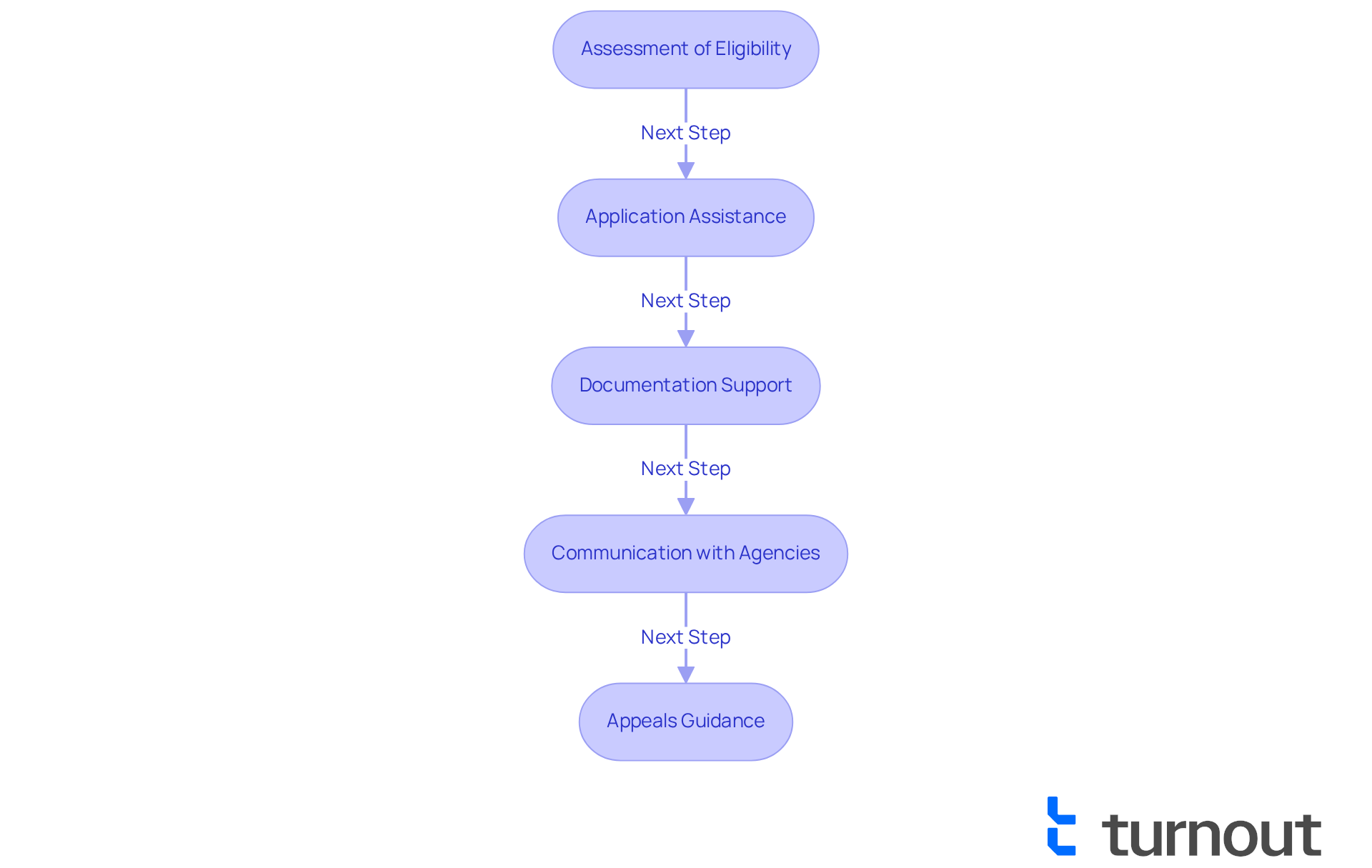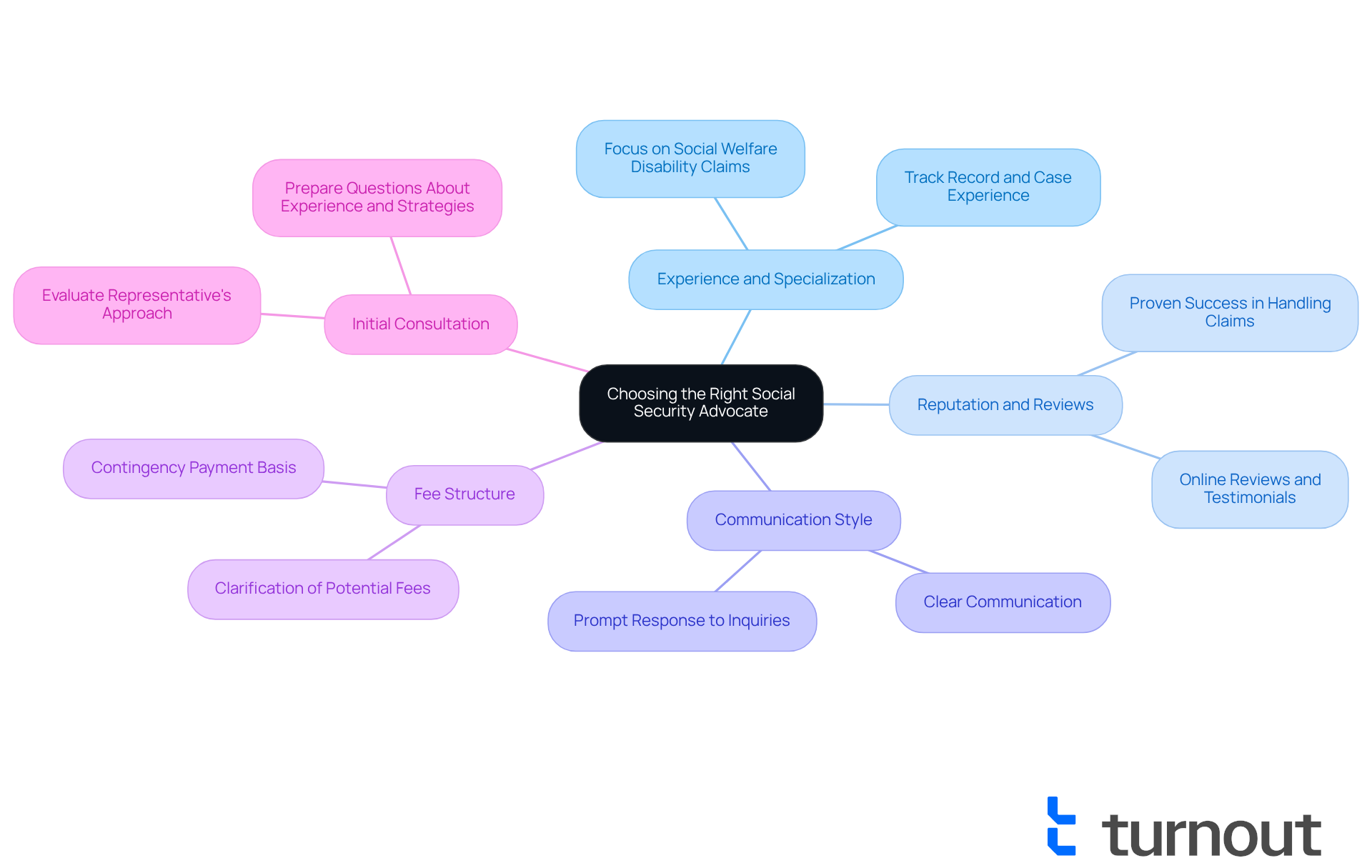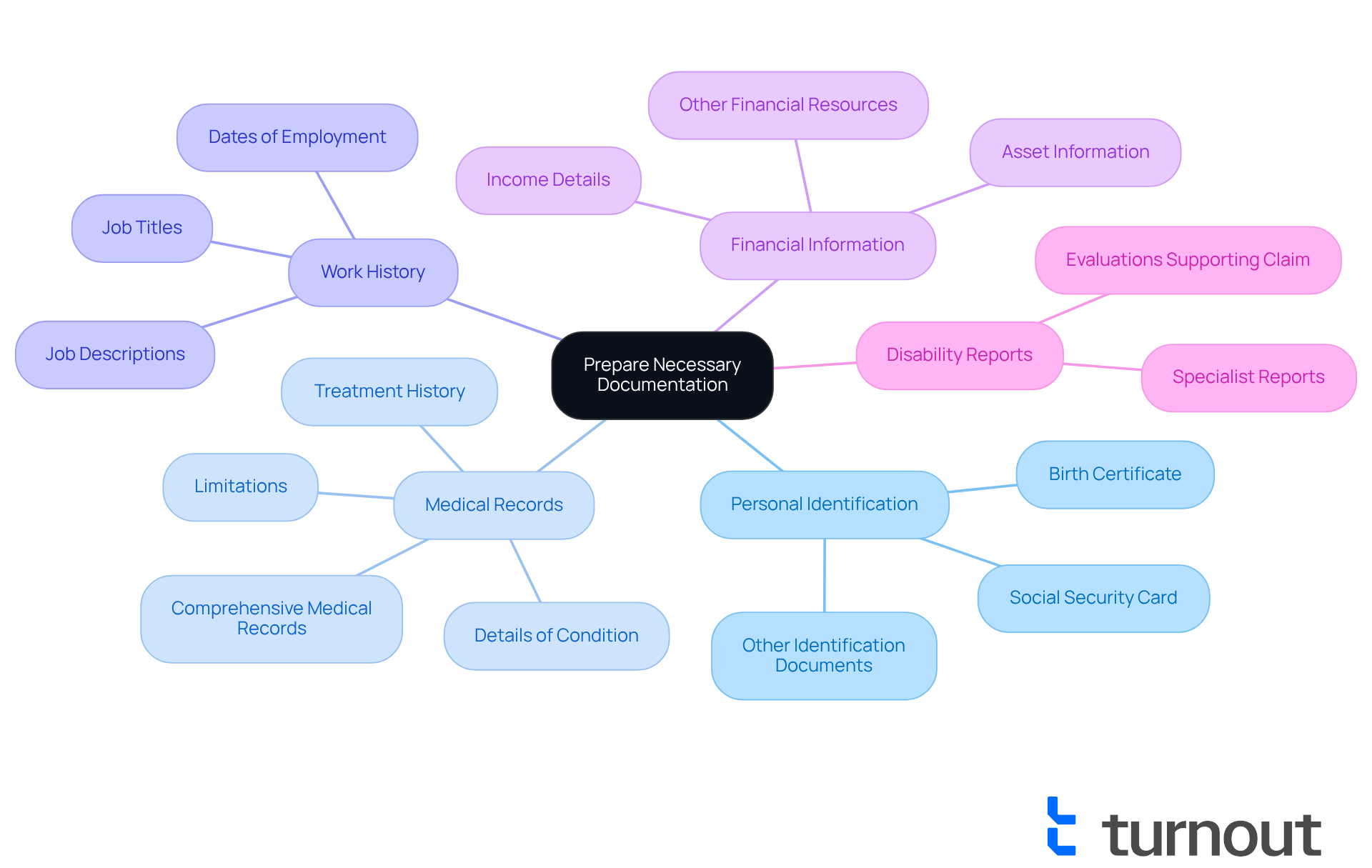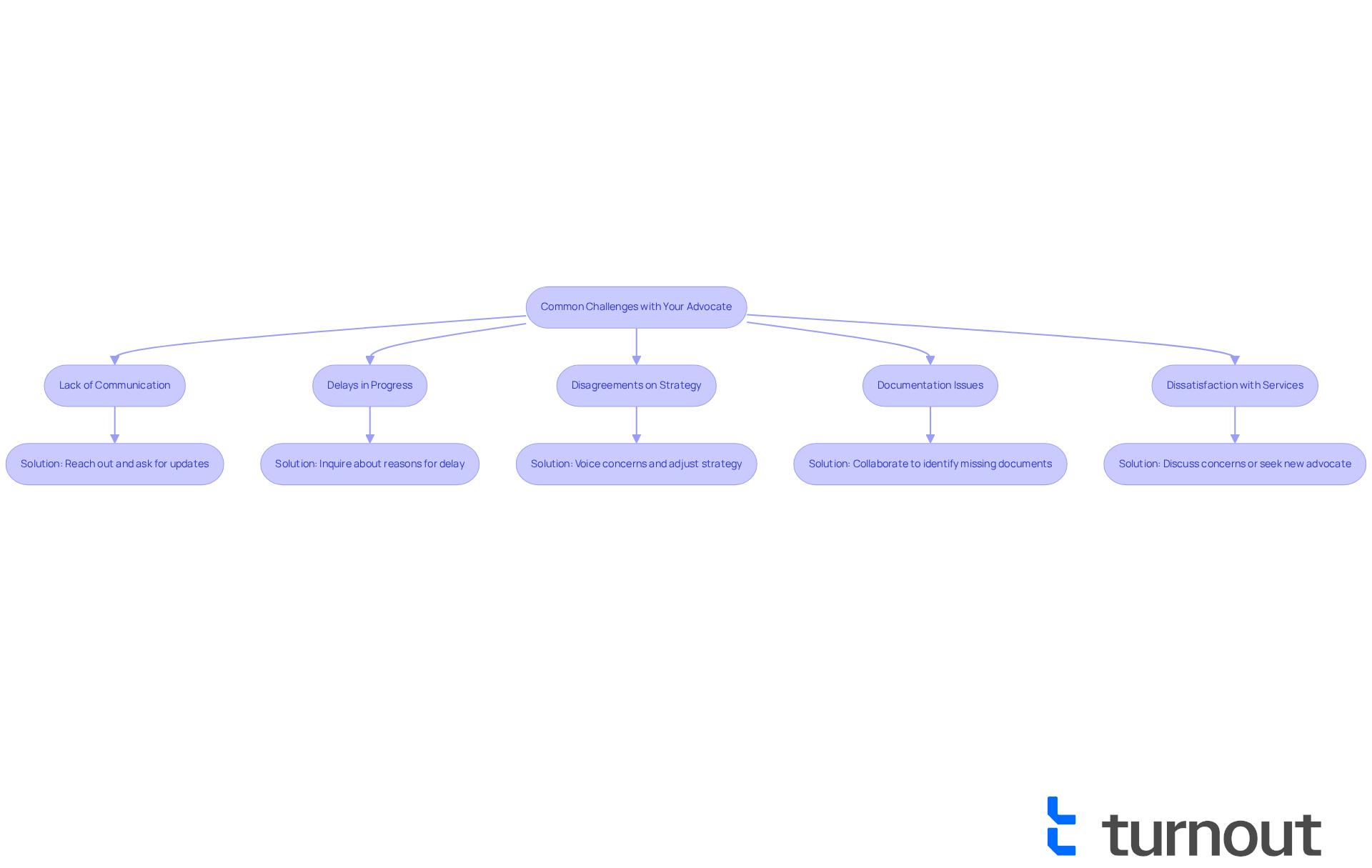Overview
Navigating the world of social security can feel overwhelming. We understand that many individuals face challenges when it comes to eligibility assessments and applications. That’s where a social security advocate can make a significant difference. These trained non-legal supporters are here to help you every step of the way, from guiding you through the application process to communicating with social benefits agencies.
Choosing the right advocate is crucial. Look for someone with:
- Experience
- A solid reputation
- A communication style that resonates with you
Remember, these advocates play a vital role in simplifying the complex SSD claims process. With their support, you can improve your chances of a successful outcome.
You’re not alone in this journey. Many have found comfort and success by reaching out for help. If you’re feeling uncertain, take a moment to reflect: What would it mean for you to have someone by your side, advocating for your needs?
We encourage you to seek out a social security advocate who can provide the support you deserve. Together, you can navigate this process with confidence and clarity.
Introduction
Navigating the complexities of social security benefits can feel overwhelming, especially if you're not familiar with the system. We understand that this journey can be daunting. That's where a social security advocate comes in. They can provide essential support throughout the application process, making things a bit easier for you.
But how do you find the right advocate to ensure your claim is successful? It’s common to feel uncertain about this step. This guide will walk you through the necessary steps to secure effective advocacy. We’ll address the challenges and considerations that can truly make a difference in achieving the benefits you deserve. Remember, you’re not alone in this journey; we’re here to help.
Understand the Role of a Social Security Advocate
Navigating the world of social benefits can feel overwhelming. A social benefits specialist is available to help you navigate this often complex process, especially if you are asking how do I get a social security advocate to assist you. Their primary roles include:
- Assessment of Eligibility: They’ll evaluate your situation to see if you qualify for benefits based on your medical condition and work history.
- Application Assistance: You’ll receive guidance through the application process, making sure all necessary forms are filled out correctly and submitted on time.
- Documentation Support: They assist in gathering and organizing essential documents, like medical records and employment history, which are crucial for a successful application.
- Communication with Agencies: Acting as a bridge between you and the social benefits administration, they manage inquiries and follow-ups to keep your case moving forward.
- Appeals Guidance: If your application is denied, they can help prepare and submit appeals, significantly boosting your chances of receiving the benefits you deserve.
In 2025, the importance of social security supporters is clearer than ever. They play a vital role in a significant percentage of claims, enhancing the likelihood of positive outcomes. It’s common to feel lost in the system, especially when the average wait time for an initial disability decision is 232 days. Supporters ensure that applicants are well-prepared, which is crucial given that over 1 million initial disability claims were pending as of April 2025.
This organization, while not a legal practice and not offering legal counsel, employs trained non-professional supporters to guide clients through this process. This means you can receive expert assistance without needing legal representation. Additionally, Turnout provides services related to tax debt relief, helping clients tackle financial challenges.
Delays in obtaining benefits can lead to financial strain and health issues, making the support from a representative even more essential. By understanding these roles, you can work effectively with your supporter, enhancing your chances of success in securing social assistance benefits and figuring out how do I get a social security advocate. Remember, you are not alone in this journey; we’re here to help.

Identify and Choose the Right Advocate for Your Needs
Choosing the right social security advocate can feel overwhelming, and we understand that this is a significant step. Here are some key factors to consider:
-
Experience and Specialization: It’s essential to find representatives who focus on social welfare disability claims. Turnout employs trained non-legal supporters ready to help you navigate the complexities of SSD claims. Take a moment to review their track record and experience with cases similar to yours. This ensures they have the expertise you need.
-
Reputation and Reviews: Investigate online reviews and testimonials from past clients. A strong reputation often reflects reliability and effectiveness in handling social security claims. You deserve someone who has proven success in this area.
-
Communication Style: Choose a representative who communicates clearly and responds promptly to your inquiries. A skilled supporter should make you feel at ease and informed throughout the process, fostering a cooperative relationship.
-
Fee Structure: Familiarize yourself with how the representative charges for their services. Many operate on a contingency basis, meaning they only receive payment if you win your case. Clarifying any potential fees upfront can help avoid surprises down the line.
-
Initial Consultation: Use initial consultations to evaluate the representative's approach and see if it aligns with your needs. Prepare questions about their experience, strategies, and how they plan to assist you in your claim.
Remember, this organization is not a legal practice and does not offer legal representation. The representatives at Turnout are skilled non-legal supporters who can help you navigate the SSD claims process efficiently. By thoroughly assessing these factors, you can determine how do I get a social security advocate who is well-prepared to assist you through the social security benefits system. You are not alone in this journey, and we’re here to help you receive the support you require.

Prepare Necessary Documentation and Information
To ensure a smooth application process, it’s important to gather and prepare the following documentation:
- Personal Identification: This includes a copy of your Social Security card, birth certificate, and any other identification documents you may have.
- Medical Records: Obtain comprehensive medical records from your healthcare providers. These should detail your condition, treatments, and any limitations you face.
- Work History: Prepare a detailed work history. Include job titles, dates of employment, and descriptions of your job duties.
- Financial Information: Collect information about your income, assets, and any other financial resources. This may be relevant to your eligibility.
- Disability Reports: If applicable, gather any reports or evaluations from specialists that support your claim for disability benefits.
We understand that this process can feel overwhelming. Remember, Turnout is not a law firm and does not provide legal advice. Once you have collected these documents, organize them in a clear and accessible manner. Consider creating a checklist to ensure you have everything required before your representative submits your application. This preparation will help streamline the process and reduce the likelihood of delays. You are not alone in this journey; we’re here to help.

Troubleshoot Common Issues with Your Advocate
While working with a social security representative at the organization, you might encounter some common challenges. Let’s explore how to navigate them together:
-
Lack of Communication: If you feel your advocate isn’t communicating effectively, don’t hesitate to reach out. Share your concerns and ask for regular updates on your case. Remember, your participation fosters open discussions, ensuring you stay informed throughout the process.
-
Delays in Progress: It’s not uncommon for cases to stall. If yours seems to be at a standstill, inquire about the reasons behind the delay. Advocates here are trained to provide clear explanations and outline the next steps, helping you grasp the complexities of the SSD claims process.
-
Disagreements on Strategy: If you find yourself at odds with your representative’s approach, it’s important to voice your concerns. A skilled advocate will listen and adjust their strategy based on your feedback, ensuring your needs are prioritized.
-
Documentation Issues: Should you encounter problems with submitted documents, collaborate with your representative to identify what’s missing or incorrect. The supporters at Turnout are ready to assist you in ensuring all essential documents are resubmitted promptly to avoid further delays.
-
Dissatisfaction with Services: If you’re feeling unhappy with the service you’re receiving, consider discussing your concerns with your representative. If issues persist, it may be time to seek a new advocate who aligns better with your needs. This organization is committed to helping you find the right support for your SSD claims, specifically by answering how do I get a social security advocate.
It’s essential to remember that this organization is not a legal practice and does not provide legal representation. By being proactive and addressing these challenges as they arise, you can maintain a productive relationship with your advocate at Turnout, which is essential for understanding how do I get a social security advocate to keep your case on track. You are not alone in this journey; we’re here to help.

Conclusion
Navigating the complexities of social security benefits can feel overwhelming. We understand that seeking help can be a daunting task, but the support of a social security advocate can make a world of difference. These trained specialists are here to help you assess your eligibility, complete applications, gather necessary documentation, and communicate with the relevant agencies. Knowing what they can do for you is essential in securing the benefits you deserve.
In this guide, we’ve shared valuable insights on how to find and choose the right advocate for your needs. Consider factors like:
- Experience
- Reputation
- Communication style
- Fee structures
when selecting a representative. Preparing the necessary documentation and being proactive in addressing any challenges can significantly boost your chances of a successful outcome.
Engaging a social security advocate isn’t just about cutting through red tape; it’s about ensuring you receive the support and resources you need during this challenging time. By following the steps outlined in this guide, you can empower yourself to find the right advocate and effectively navigate the social security claims process. Remember, you are not alone in this journey; we’re here to help you achieve a successful resolution.
Frequently Asked Questions
What is the role of a social security advocate?
A social security advocate helps individuals navigate the complex process of obtaining social benefits. Their primary roles include assessing eligibility, providing application assistance, supporting documentation gathering, communicating with agencies, and offering guidance on appeals if applications are denied.
How do social security advocates assess eligibility?
They evaluate your situation based on your medical condition and work history to determine if you qualify for benefits.
What kind of assistance do social security advocates provide during the application process?
They guide you through the application process, ensuring that all necessary forms are filled out correctly and submitted on time.
How do advocates help with documentation?
Advocates assist in gathering and organizing essential documents, such as medical records and employment history, which are crucial for a successful application.
What role do advocates play in communication with agencies?
They act as a bridge between you and the social benefits administration, managing inquiries and follow-ups to keep your case moving forward.
What happens if my application is denied?
If your application is denied, advocates can help prepare and submit appeals, significantly increasing your chances of receiving the benefits you deserve.
Why is it important to have a social security advocate in 2025?
The importance of social security advocates is heightened due to the significant number of claims and the average wait time for an initial disability decision, which is 232 days. They help ensure that applicants are well-prepared, which is crucial given the backlog of over 1 million initial disability claims pending.
Are social security advocates legal representatives?
No, social security advocates are not legal representatives and do not offer legal counsel. They are trained non-professional supporters who provide guidance through the process.
What other services do organizations like Turnout provide?
In addition to social security advocacy, Turnout offers services related to tax debt relief, helping clients tackle financial challenges.
How can delays in obtaining benefits affect individuals?
Delays can lead to financial strain and health issues, making the support from a representative essential in securing social assistance benefits.




